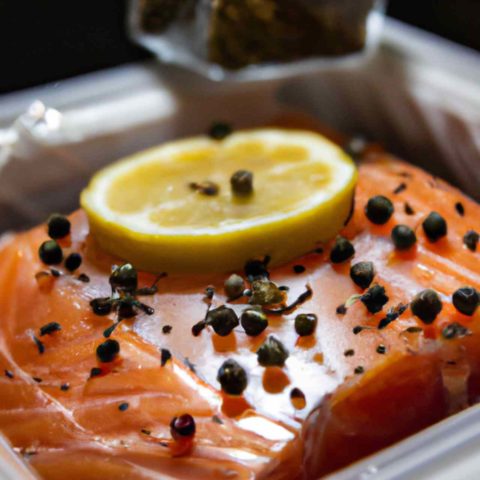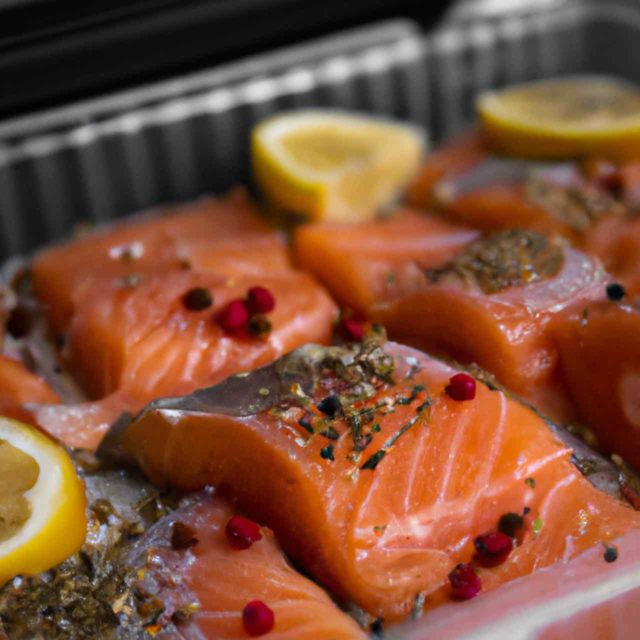How Long Does Raw Salmon Last in the Fridge?
Salmon is a healthy and delicious fish rich in omega-3 fatty acids and protein that can be enjoyed in many different ways.
However, it’s important to know how long salmon can last in the fridge before it goes bad.
You can buy salmon in advance when serving it for a big group, but how much salmon is a single serving per person?
This blog post will explore the best ways to store raw salmon and how long it will stay fresh.
We’ll also discuss the benefits of freezing raw salmon and give tips on how to cook it properly.
So, whether you’re a beginner or an expert in cooking salmon, read on for some valuable information!
How to Store Raw Salmon
Raw salmon must be stored correctly to maintain flavor and texture and prevent foodborne illness. Here are some tips on how to store raw salmon:
1. Immediately after purchasing, place the raw salmon fillet in an airtight container or freezer bag to avoid freezer burn and store it in the refrigerator. The temperature should be between 33°F-40°F (1°C-4°C).

2. If you plan to eat the salmon within two days, you can store it in the refrigerator’s main compartment. If more than two days old and still not eaten, then transfer it to the freezer.
3. To freeze raw salmon for a longer storage time, wrap it tightly in a plastic bag or freezer paper. Make sure to remove all the air from the package before sealing.
4. It is important to label and date your raw salmon packages so that you can easily identify them and keep track of storage times for food safety.
5. Once frozen, raw salmon should be used within two to three months.
6. When you are ready to thaw the frozen fish, do so in the refrigerator or under cold water (a big no for hot water) until it is completely thawed. Never leave it at room temperature, as this may cause bacteria to form and render your salmon unsafe for consumption and can lead to food poisoning.
7. After thawing, cook the salmon immediately, as bacteria can form quickly. Raw salmon can usually last up to 1-2 days in the fridge after being frozen and thawed. Be mindful of how much you defrost at once, as it is not recommended to refreeze products that have already been thawed. Remember, safety comes first!
8. While for smoked salmon can last a surprisingly long time in the freezer, so you don’t have to worry about running out of your favorite fish anytime soon.
It can be stored for up to 2-4 months in the freezer if properly packaged and protected from air or freezer burns. To ensure it stays as fresh as possible, portion it into freezer-safe airtight containers or Ziploc bags.
Following these tips can help you store your fresh salmon safely and ensure its flavor and texture are not compromised.
It will also prevent foodborne illnesses from occurring due to incorrect storage conditions. Remember that raw fish should always be stored separately from cooked or ready-to-eat foods. T
his will limit the potential for cross-contamination and keep your salmon safe to eat. Use proper storage handling techniques when preparing and eating raw salmon.
(What are good sides to serve with salmon)
What are the Signs that Salmon has Gone Bad?
Bad salmon will have a slimy residue texture, an off odor, and discoloration. If you see any of these signs, do not eat the salmon and throw it away.

If uncooked salmon has an off odor, it is best to discard it. The same holds true for cooked salmon with an unusual fishy smell or slimy texture. You can also tell if raw salmon has gone bad by feeling slimy and looking for discoloration.
Fresh raw fish should feel firm and have a translucent color. If it has a slightly gray color, discard it.
If your cooked salmon looks discolored or grayish, it indicates that the fish has gone bad and should not be consumed. The same holds true for any cooked seafood. If you notice a slimy texture on the surface of the fish, do not consume it.
It is important to note that if the salmon has been refrigerated for too long, there may be signs of spoilage even though the fish looks and smells fine.
If the salmon has been stored in ice or cold temperatures for more than three days, it should be discarded as soon as possible.
Benefits of Freezing Raw Salmon
Freezing quality salmon also helps to minimize waste and save money. Freezing the fish can be stored for long periods, allowing you to use what you need when you need it.
Keeping large quantities of fish on hand is also cost-effective without going over budget. This can be especially helpful if you plan to make multiple meals with salmon or have a large household that consumes it regularly.
Additionally, freezing raw salmon helps preserve its nutritional content so you can reap the benefits of its healthy omega-3 fatty acids and essential vitamins and minerals. Unlike frozen cooked salmon, which often loses some valuable nutrients during cooking, frozen raw fish will maintain its original nutrient content until you are ready to prepare it.
This makes it an ideal choice for those looking to maximize the nutritional value of their meals.
Freezing raw salmon is a simple way to ensure it stays fresh and safe to consume for longer periods of time. By preserving its flavor, texture, and nutrients, you can enjoy many health benefits without wasting valuable time or money.
It is also easy for meal preparation and can save you a lot of time in the kitchen. With frozen salmon on hand, you can defrost it when ready to make a delicious meal. This eliminates the need to buy fresh fish daily, reducing grocery costs and preventing food waste. It also requires minimal preparation, so you can quickly cook a healthy meal for your family.
All in all, freezing raw salmon is an easy and convenient way to enjoy its nutritional benefits without sacrificing flavor or freshness.
Conclusion
We hope this guide helped you learn more about the benefits of freezing raw salmon, as well as how long it can last in the fridge and freezer. Share this with anyone who loves salmon so they can take full advantage of all that frozen raw salmon has to offer!